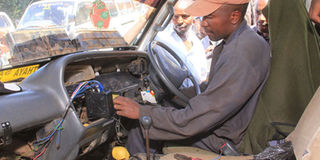Matatus stall on safety measures

A technician installs a digital speed governor on a matatu. Only a quarter of matatus in Mombasa have complied with the new traffic rules. PHOTO/FILE
What you need to know:
- Only quarter of vehicles have complied with rules, sparking fears that fares will continue to rise.
- One inspector says many matatu operators do not take the new regulations very seriously.
Only a quarter of matatus in Mombasa have complied with the new traffic rules, sparking fears that fares will continue to rise.
Six hundred out of at least 3,500 matatus in the county have met the requirements set by the National Transport and Safety Authority.
The few matatus operating have raised fares, with the owners saying they need to recoup the money they spent on fitting speed governors and paying new county charges.
Mr George Gichengo, an inspector at the Miritini Inspection Unit, attributed the low compliance to laxity by owners.
“Most of these operators did not take these regulations seriously. Their vehicles have to be inspected and awarded a compliance certificate before they get to the TLB section,” he said.
APPROVED FIRMS
He noted that there were about 20 companies that were certified to supply the speed governors needed.
Only vehicles fitted with new speed governors from these companies will be inspected, Mr Gichengo added.
A letter from the Director of Motor Vehicle Inspection, Mr Gerald Kaguri Wangai, addressed to inspection officers asked them to ensure they check data from vehicles fitted with speed governors.
“The data should contain the vehicle owner’s name, identification and phone numbers, vehicle registration, email address and business registration,” said Mr Gichengo.
The letter also required that all vehicles should have the speed governors properly fitted and the speed clock must be functioning before they are inspected.
Some matatu owners were turned away as they were not aware that they needed to install a new speed recorder before their vehicles would be inspected. The operators complained of a shortage of speed governors and the high prices they are retailing at.
“Each matatu needs at least Sh70,000 to comply with the rules. It is inconveniencing not just us, but commuters as well,” said a matatu owner.
Matatu operators are required to remove any additional decorations on the vehicle. In addition, the names of their saccos must be visible and they must employ drivers and conductors on a permanent basis.
High Court Judge George Odunga on Monday stopped the implementation of the tough rules that were to take effect today.
Judge Odunga also censured the Cabinet Secretary for Transport, Mr Michael Kamau, over the reintroduction of the rules, which had already been declared illegal.
He said that the State was fully aware that the issue was pending in court but went ahead to revoke and reintroduce an earlier legal notice that had been challenged on the same premise.
Under the new rules by the NTSA, all public service vehicles must belong to a sacco that has at least 30 vehicles.
Each sacco must give the safety authority a list of all its employees and submit a monthly report showing how many of its vehicles were involved in accidents and what was done about them.
PSVs were also required to remove roof racks, which meant that passengers who travel upcountry with their luggage had to find an alternative method to move their belongings.
Coast traffic boss Martin Kariuki last week said there was no short-cut to the new traffic rules and urged matatus to comply early.
He maintained that the department will not allow any vehicle on the road that has not fully complied with the new rules despite Mombasa being among the worst-hit by the public transport crisis.





